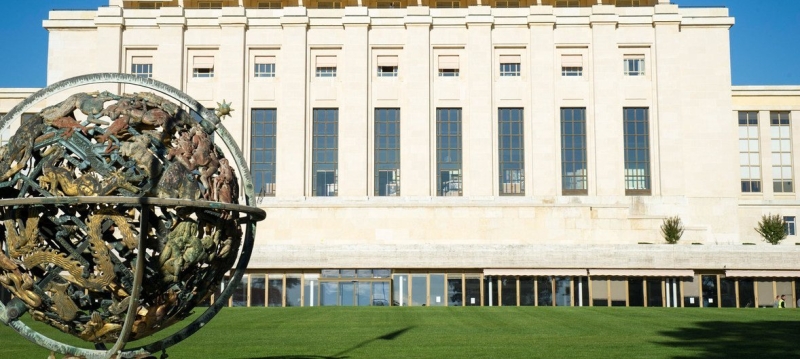
UN building in Geneva. UN Committee: Georgia failed to protect pupils of the St. Nino boarding school from violence Human Rights
The UN Committee on the Rights of the Child found that Georgia violated its obligations in the field of children’s rights by failing to take immediate measures to protect residents of a boarding home run by the Georgian Orthodox Church from physical and psychological abuse.
On Thursday, the Committee issued a decision after considering a complaint filed on behalf of 57 children living at the St. Nino boarding school in Ninotsminda at the time of its filing.
Cruel Treatment
Pupils of the orphanage M.L. and L.K. told Committee members about the extent of the ill-treatment. Born in 2008, M.L. from three to thirteen years old she lived in the St. Nino boarding school, where she was severely punished for bedwetting. Caregivers often instructed older children to “punish” her and others by beating them and caning them. She was forced to take psychotic drugs at the age of 11.
Another child, L.K., born in 2003, faced similar difficulties, including inadequate nutrition, poor hygiene and limited mobility. His brother, who had a disability, was treated the same way.
Responsibility of the Government of Georgia
“Children deprived of a family environment , have the right to special protection and assistance from the state, which is their guardian,” said Committee member Benoit van Keirsbilk, adding that the Georgian government is thus responsible for what happens behind the closed doors of an orphanage or any other similar institution.
Attention from the Ombudsman
Ninotsminda children’s boarding school St. Nino is a boarding school for orphans and children left without parental care. His deplorable condition was first noted by the office of the Public Defender (Ombudsman) of Georgia in a report for 2015.
The document noted frequent cases of psychological and physical abuse of children, as well as the use of corporal punishment. The children were not allowed to eat and were locked up. However, in 2016, after the new version of the Law of Georgia “On Licensing of Educational Activities” came into force, the orphanage received a license.
For almost a year, starting in June 2020, the Office of the Public Defender was repeatedly denied access to the orphanage.
Complaint to the UN Committee
Noting that the authorities were unable to protect the rights of the orphanage residents, the NGO Partnership for Human Rights first appealed to various courts in Tbilisi, and in May 2021 referred the case to the Committee.
The Committee immediately took interim measures in favor of 57 children who applied to the Public Defender. A month later, representatives from the Ombudsman’s Office were allowed into the orphanage to conduct a comprehensive assessment, which resulted in 27 children being transferred to other care facilities.
As of November 2021, the children’s There were still 15 children living in the home, including at least one with a disability, although the issues raised remained unresolved.
Committee Members’ Findings
Having considered the complaint, the Committee concluded that Georgia did not ensure the protection of children at the St. Nino children’s boarding school in Ninotsminda.
Members of the Committee addressed Georgia with a request to ensure redress for the injured children, including providing them with compensation and conditions for rehabilitation, as well as making a public apology to them.
In addition, UN experts recommended monitoring the situation of others children in state care and conduct an independent investigation to bring those responsible to justice.
“We are appalled by the situation facing children deprived of their families. They will feel the consequences of these injuries for the rest of their lives,” said Committee member Benoit van Keirsbilk.
